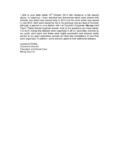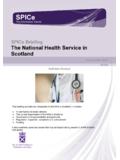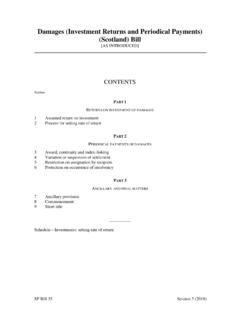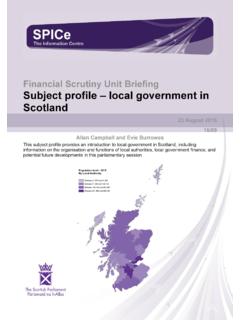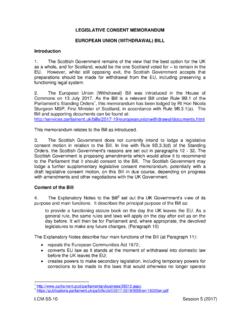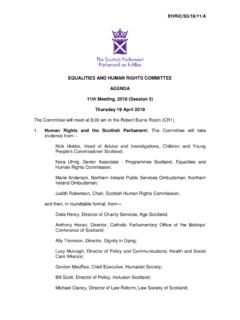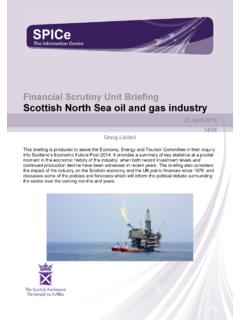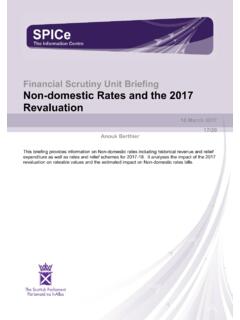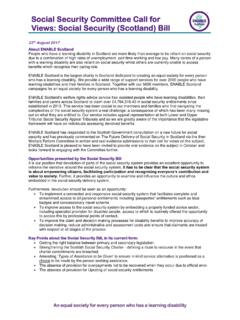Transcription of RURAL ECONOMY AND CONNECTIVITY …
1 RURAL ECONOMY AND CONNECTIVITY COMMITTEE SALMON FARMING IN SCOTLAND SUBMISSION FROM THE NATIONAL TRUST FOR SCOTLAND The National Trust for Scotland (NTS) welcomes the opportunity to contribute written evidence to the Committee s review of Salmon Farming in Scotland. NTS acknowledges that salmon farming is making a valuable contribution to Scotland s ECONOMY and coastal communities. However, in speaking up to protect the environment we believe that these benefits will be undermined if the industry continues on its current trajectory and action is required as a matter of urgency. 1 General views on the current state of the farmed salmon industry in Scotland The National Trust for Scotland endorses the view of the Environment, Climate Change and Land Reform (ECCLR) Committee that the salmon farming industry exerts a large and growing impact on Scotland s marine environment and that, if these issues are not addressed, expansion of the industry to meet its growth targets will be unsustainable and may cause irrecoverable damage to the environment.
2 We would therefore like to see a moratorium on any new farms or expansion of existing farms until these problems have been overcome and effectively controlled. This is in line with the application of the precautionary principle under Scottish Planning Policy (2014) for the protection of the environment, and of the ecosystems services approach under the United Nations Sustainable Development Goals. There are serious concerns about the release of organic waste and chemical pollutants into the environment that are not being effectively regulated through the failure to apply adequate standards. Aquaculture is now the largest polluter of the marine environment on the north-western coast of Scotland. It appears to be subject to lower controls than any other industry, and has the lowest rate of compliance with the already inadequate environmental quality standards.
3 This cannot be allowed to continue. The disturbance of cetaceans through the use of Accoustic Deterrent Devices is we believe in contravention of the Habitats Directive1. More serious in the long term and more difficult to tackle are the impacts on wild salmon and seatrout. It is ironic that the marketing of the brand of Scottish farmed salmon trades on the image of these internationally famous and spectacular members of our wild fish fauna but simultaneously the industry is we believe a major cause of the collapse of populations of these fish from most of the west coast. This has been caused by the transfer of disease organisms, primarily sea lice, to wild salmon and seatrout, and by interbreeding of escaped salmon with their wild relatives. There is ample and growing evidence of the scale of this impact.
4 The attempts by the industry and its supporters to question and throw doubt on this evidence is concerning. Scottish Government policy since the early 2000s has been to allow fish farming on the west coast but prevent it on the north and east coasts, apparently in an attempt to protect the 1 From a legislative perspective, deliberate disturbance of European Protected Species, such as cetaceans, contravenes the Habitats Directive (Conservation (Natural Habitats, &c.) Regulations 1994 as amended in Scotland). Marine Scotland (2014), Evaluating and Assessing the Relative Effectiveness of Acoustic Deterrent Devices and other Non-Lethal Measures on Marine Mammals lucrative and famous salmon and seatrout rivers on the east coast2. Effectively this was a tacit admission that we could have either fish farms or wild salmonids but not both.
5 This policy has proved to be both well founded and effective: the conservation status of wild salmon in rivers on the east coast is markedly higher than for rivers on the west coast3. Its effect has been not only to degrade the natural environment, including a European protected species, the Atlantic salmon, but to damage the property rights of riparian and fishery owners on the west coast and associated economic interests. This policy was apparently adopted without any public consultation and certainly without discussion with the property owners or economic interests most severely affected. The economic benefits of wild populations of salmonids have been effectively captured by salmon farming interests who bear none of the environmental costs. This de facto transfer of assets may or may not be a rational decision for Scotland s overall economic benefit, but it is impossible to discuss its merits in the absence of official recognition of the link between aquaculture and the loss of wild salmonids.
6 It is essential that this link is recognised and an open debate initiated on the long standing policy of sacrificing wild salmonids to fish farming. 2 Future development of the salmon industry We believe that current plans for the expansion of the salmon industry a doubling of production and extending its geographical range - are unsustainable and will be hugely damaging to the environment without a radical change in the way in which the industry is conducted and regulated. This is why NTS is calling for a moratorium on new farms or expansion of existing farms until environmental controls and regulation are strengthened to address the concerns identified by the ECCLR Committee. While some of the problems with environmental pollution can be solved by stricter regulation of the industry it is doubtful whether the transfer of sea lice to wild fish can be.
7 Existing measures are entirely ineffective in preventing the release of damaging quantities of lice larvae and the fact that seatrout populations have been shown to disappear within 2 or 3 years of the establishment of a fish farm4 suggests that even small quantities of lice may be lethal. Attempts to control the level of lice infection on open-cage farms (through chemical therapeutants, cleaner fish, thermo-licers, skirts, etc.) are highly unlikely to achieve the level of control necessary to protect wild fish. The only form of technology that would provide an adequate safeguard for wild fish would be the adoption of Recirculating Aquaculture Systems (RAS) to fully manage waste streams and pollution. It is imperative that these are adopted as soon as possible and certainly before any expansion of the industry can be contemplated.
8 RAS would also have the advantage of curing many of the other environmental problems from pollution, damage to cetaceans and seals and escapes. 3 Management of fish health and environmental challenges by the industry As highlighted by SEPA, the level of compliance with environmental regulations by the aquaculture industry is one of the lowest of any sector that they regulate5. This cannot be allowed to continue. Furthermore, attempts by the industry to influence the environmental 2 An assessment of the benefits to Scotland from aquaculture. Marine Scotland (2014) 3 Percentage probability of Scottish rivers reaching salmon Conservation Limits (five-year average 2012-2016), shown using Marine Scotland Science data 4 5 SEPAView, June 2017 quality standards in their favour have been to the detriment to the environment.
9 While the industry has a clear interest in reducing fish health problems, the overall level of fish mortality is high and growing, demonstrating that their ability to manage fish health is falling. More importantly, the targets for sea lice infestation are not being met by a wide margin and, in any event, are ineffective in protecting wild salmonid populations. 4 Collection of data on salmon operations and fish health Collection of data on biomass, production, mortality, fish health and environmental condition is essential for the effective management of the industry. While the primary use of these data is by the regulators, it is important that they are made publicly available to adequately assess the impact on resources on which other users depend ( wild salmonids, commercial shellfish, seabed environment).
10 The industry has previously argued that these data are commercially confidential but this view has been successfully challenged through the Information Commissioner. It is important that this information is now provided in a timely and complete manner. Of more concern is the way in which the data are collected, relying on self-reporting. This is open to abuse and, more importantly, may impede enforcement. The principle in Scots law of self-incrimination may prevent the use of such data in successful prosecution of infringements. SEPA s proposal6 to itself undertake the monitoring of fish farm impacts on the seabed is therefore welcome, and this could be extended to other potential impacts. 5 Robustness of the regulatory regime We concur with the ECCLR Committee s view that: The current consenting and regulatory framework, including the approach to sanctions and enforcement, is inadequate to address the environmental issues.
